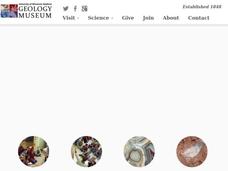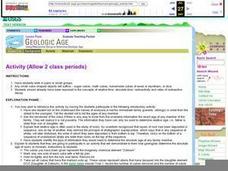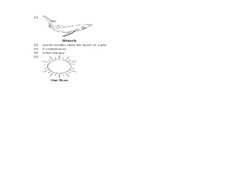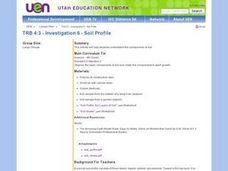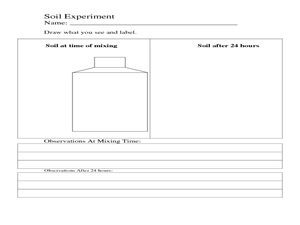Curated OER
Types of Scientists
In this science worksheet, students match each type of scientist listed in the left-had column to its correct description found in the right-hand column. There are 34 different scientists to match on the sheet.
Curated OER
Super Scientist Quiz
In this science worksheet, students match each of the descriptions on the right to the correct scientist listed on the right. There are thirty scientists to identify and match on the sheet.
Curated OER
Geologic Time Scale
Young scholars research the geologic time scale. They create and recognize the importance of a geologic time line.
Curated OER
Detectives in the Landscape
Fourth graders explore landscapes. In this landscape activity, 4th graders investigate different elements of landscapes. Students design a visual presentation using photographs taken during a nature walk.
Curated OER
Soil Scrolls
Third graders examine soil samples and explore the what happens in each layer of the subsoil. They work in cooperative groups to create a scroll that shows what takes place in each layer, and discuss why much of the activity is in the...
Curated OER
Using Radioactive Decay to Determine Geologic Age
Students investigae using radioactive decay to determine geologic age.
Curated OER
Bird Seed Mining
Learners search through the seed mixture and separate out our "mine" beads, sunflower seeds, and other grain products, making piles of each. students count up the number of gold, silver, and blue beads, and sunflower seeds from their piles
Curated OER
Fossils
In this earth science learning exercise, learners use the clues given at the bottom of the sheet to solve the crossword puzzle on fossils. They identify specific names of fossils and how to make a mold of one.
Curated OER
Binary Compounds
Binary compounds are explained with the periodic table, atomic charges, and examples. Viewers are taught to name binary compounds and then are presented with a chart of cations and ions. Finally, they see a few photos of forms of silicon...
Curated OER
Life on the Ocean Floor
Why would water 2700 meters deep suddenly become warmer? Explore this and other ocean floor discoveries through this reading response worksheet. Scholars read information about the organisms discovered by Alvin, a deep-sea submersible....
Curated OER
WS 9.9 Presentation Questions
In this presentation worksheet, students answer questions about five different topics presented in class. These include acid rain, acid etching, pH testing, cave formation and kidney stones.
Curated OER
Arizona Vocabulary
In this Arizona vocabulary skills worksheet, students match the 10 listed Arizona-related terms and names to the appropriate sentences that describe each of them.
Curated OER
Science Review for Grade 3 (3.5)
In this science review for grade 3 (3.5) worksheet, 3rd graders answer 25 multiple choice questions in standardized test format about fossils, simple machines and heat transfer.
Curated OER
Back to the Past
Pupils label fossil imprints. In this Geology lesson, students view fossil imprints of several items. Pupils explain what a fossil is.
Curated OER
Lesson 1 - What Are Fossils?
Students define and research fossils. In this fossil lesson, students access teacher assigned Internet sites to examine images of fossils. They determine the definition of a fossil and find out how fossils are formed. They also define a...
Curated OER
Weathering, Erosion, and Deposition Study Guide
In this weathering, erosion and deposition worksheet, students answer questions about the causes of weathering, the types of weathering such as mechanical and chemical weathering and resistance to weathering. They also write two...
Curated OER
Gallery Walk Questions about Energy and Material Cycles
Students state the physical, chemical or biological processes associated with these environments: Pelagic ocean zone, California coat Cave, Indiana Barrier island beach, North Carolina Sand dune, Dunes National Park, Colorado Wetland and...
Curated OER
Modeling a Soil Profile
In this soil profile activity, students use a cup to create the layers of soil using clay, sand, gravel and dirt. Students label each component as either A, B, or C horizon and the bedrock. They answer questions about their model.
Curated OER
Investigation 3 - Weathering
Fourth graders study 4 types of weather processes: wind, running water, plant growth, and freezing water. They explain how the processes of weathering and erosion change and move materials that become soil. They draw diagrams...
Curated OER
Investigation 6 - Soil Profile
Fourth graders study the components of soil. They observe the basic components of soil and relate the components to plant growth. They record color, texture, and kinds of materials on their profile log (light color, denser, grittier -...
Curated OER
PICTURE PERFECT PYRAMID
Students create a model of the USDA's Food Pyramid Guide, using shoe boxes. They bring an assortment of shoe boxes from home. Students are given a copy of the "Food Guide Pyramid." They wrap boxes for the bread group in white, the...
Curated OER
Homes for Hermit Crabs
Students discover the differences between hermit crabs and mollusks and identify their parts. After reading a story about hermit crabs, they complete an anatomy worksheet. For another activity, students fold and cut a diagram of a hermit...
Curated OER
Under Our Feet
Students investigate the forest ecosystem to learn of the living and non-living elements of the soil. In this ecosystem instructional activity, students examine soil for twigs, moss, fungi, leaves, roots and other matter. Students...
Curated OER
Regolith Formation
Students study what regolith is and how it contrasts with weathering on Earth. In this weathering instructional activity students divide into groups, hypothesize and confirm their guesses.
Other popular searches
- Rocks and Minerals Worksheet
- Rocks and Minerals Crossword
- Geology Rocks and Minerals
- Rocks and Minerals Word Search
- Rocks and Minerals Flowchart
- Minerals Rocks Soils
- Notes Rocks and Minerals
- Minerals and Rocks
- Abc Rocks and Minerals
- Science Rocks and Minerals
- Comparing Rocks and Minerals
- Sedimentary Rocks Minerals




